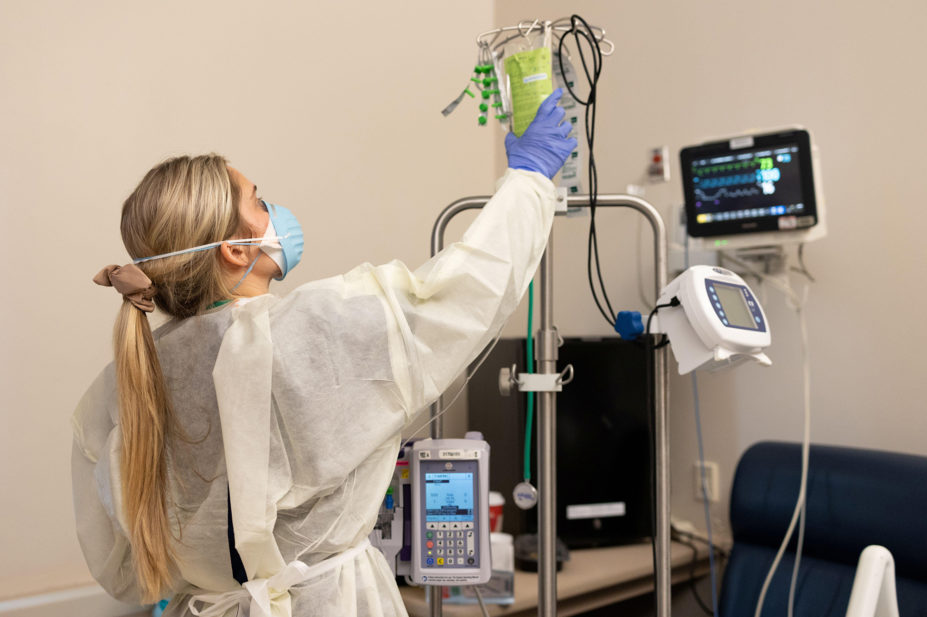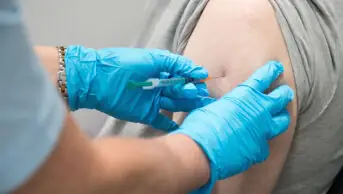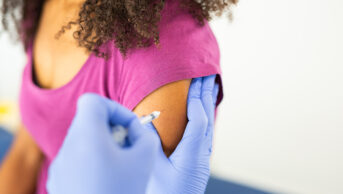
REUTERS / Alamy Stock Photo
More than 18,000 COVID-19 patients have received the monoclonal antibody (MAb) sotrovimab since December 2021, despite growing doubts about its efficacy against the current dominant COVID-19 variant in the UK, Omicron BA.2.
Figures, published by NHS England on 8 April 2022, showed that 18,147 patients received sotrovimab between 16 December 2021 and 6 April 2022, while 6,298 and 8,262 patients had received the antivirals nirmatrelvir and ritonavir (Paxlovid), and molnupiravir (Lagevrio), respectively.
Early data released by the UKHSA in January 2022 showed that 3,370 patients received sotrovimab in the first month it was offered, suggesting that almost 15,000 patients have received the MAb in the three months since.
While the figures were published amid concerns that some patients are having difficulty accessing the COVID-19 treatments (see Box), some experts have warned that the continued use of sotrovimab is “inappropriate”, owing to the dominant BA.2 variant in the UK.
The UK government currently recommends sotrovimab as a third-line treatment for patients who test positive for COVID-19 following their admission to hospital, but first-line for eligible non-hospitalised patients.
However, concerns are being raised about its efficacy, with the US Food and Drug Administration (FDA) revoking its authorisation of sotrovimab for treating COVID-19 on 5 April 2022, owing to the increasing proportion of COVID-19 cases caused by the Omicron BA.2 sub-variant.
In its decision, the FDA said clinical pharmacology data for sotrovimab suggested that the authorised dose of the drug was unlikely to be effective against the SARS-CoV-2 Omicron BA.2 variant.
The Omicron BA.2 variant has been the dominant COVID-19 variant in the UK since the middle of February 2022, according to an update from the UK Health Security Agency (UKHSA) published on 25 March 2022, which added that BA.2 was estimated to account for approximately 93.7% of COVID-19 cases in England and continued to demonstrate a “substantial growth advantage”.
“Sotrovimab is clearly unlikely to have any effect in patients affected by the omicron BA.2 variant,” said Penny Ward, visiting professor in pharmaceutical medicine at King’s College London.
“Given the time taken to sequence, it is unlikely to be possible to sequence to confirm which strain the patient is affected by and only then administer the product to individuals affected by a sensitive strain, so I personally think it is inappropriate to continue to use sotrovimab at this point,” she added.
“We also do not yet have access to Evusheld, an antibody which has shown both preventative and therapeutic activity vs COVID-19 and is also still effective vs the Omicron variants although this is MHRA- [Medicines and Healthcare products Regulatory Agency] approved for use to prevent COVID-19 among immunocompromised patients unable to respond to vaccination,” said Ward.
“It may well be asked why the UK appears to be behind the curve on responding to emerging data on variant sensitivity and also why despite its approval Evusheld has yet to be made available for clinical use in the population at highest risk.”
Laura Squire, chief healthcare access and quality officer at the MHRA, said that all conditional marketing authorisations, including that for sotrovimab, were under “constant review” to ensure that the benefits outweighed the risks.
“The MHRA is carefully reviewing emerging data for sotrovimab, including in response to new variants, and we continue to seek advice from the independent scientific advisory body, the Commission on Human Medicines, to determine if its benefit risk balance remains favourable,” she added.
“As part of this ongoing review, we are in contact with the FDA and are looking closely at the data supporting their decision. Patient safety is our top priority.”
Vulnerable patients struggling to access COVID-19 treatments
Concerns have been raised that some patients are having difficult accessing the COVID-19 antiviral and monoclonal antibody treatments and that there is a lack of clarity as to what COVID-19 tests are required.
The therapies are given through COVID-19 Medicine Delivery Units to those most at risk including those who have been treated recently for cancer or with some autoimmune conditions.
Those who are eligible may have initially been sent an at-home PCR but the criteria has recently been updated to include an NHS-provided positive lateral flow test. Clinically vulnerable patients should be able to order them to keep at home to use if they have any symptoms.
Richard Evans, deputy director of marketing and communications at Blood Cancer UK, said: “A lot of people with blood cancer have developed COVID-19 and have struggled to get the new treatments.”
While there was an understanding there could be teething problems when the treatments were first introduced and services were being set up in January 2022, “they really should have been sorted out by now”, he added.
“We do need them to make sure that everyone has easy access,” he said.
One concern the charity has is not enough people understand that the system has how changed to allow lateral flow tests rather than PCR as proof. But also that those tests have to be issued by the NHS as you cannot report a privately bought one.
Jo Nove, acting chief executive at blood cancer charity Myeloma UK, said that she had heard reports from patients who had been denied access to antivirals either because they were wrongly told that they were not eligible for treatment, that their symptoms are not serious enough or because they didn’t know how to get hold of antivirals in the first place.
“It’s frustrating that more than four months after the antivirals were rolled out, patients are still experiencing these problems and are having to fight for the treatments they are eligible for,” she added.
“The issue of access seems to get worse at the weekend, with many left with no choice but to wait until the following Monday. This delay means that some of them end up exceeding the five-day cut-off point to receive antivirals.”


